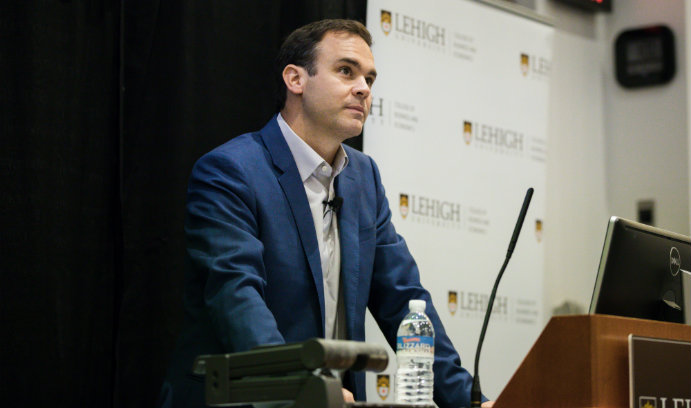London Business School on Gaining and Using Power

Power shapes every interaction. Powerful people get their way often, we’re generally nicer to them, and we listen to them. So how do you get power and use it? Power is a zero-sum game and complicated to discuss. However, for London Business School Associate Professor Ena Inesi, that’s what makes it so appealing to study.
UVA, Oxford, CEIBS Rise in All-New Financial Times 2019 Ranking

The latest Financial Times MBA ranking is officially out, with several international schools rising closer and closer to the top in 2019.
What Are the 5 Most Common MBA Interview Questions?

To get into an MBA program, you’ll first have to make it through the interview process. Depending on where you apply, you could be asked a range of different questions, many of which are specific to the school. Unfortunately, this can make it difficult to prepare for success, especially if you’re applying to more than one school at a time.
To help you prepare for your MBA interview, we’ve gathered together the five most common MBA interview questions, along with advice for answering each question. But first, we need to figure out what questions you’re most likely to run into.

Determining the Five Most Common Interview Questions
In a recent podcast on Clear Admit, Alex Brown, who wrote Becoming a Clear Admit: The Definitive Guide to MBA Admissions, tackled some of the most common MBA interview questions faced by current applicants. He unpacked interview questions such as, “Walk me through your résumé” as well as “Give us an example of a time you took a leadership role.”
To get a full idea of the most common interview questions, we took a look at the top ten schools as outlined by the U.S. News & World Report to figure out which questions were asked by the most schools. We looked at:
- UC Berkeley Haas
- University of Michigan Ross
- Northwestern Kellogg
- MIT Sloan
- Stanford Graduate
- The Wharton School
- Chicago Booth
- Harvard Business School
- Columbia University
- Dartmouth Tuck
At each of these schools, there were a few common denominators when it came to questions asked. Here’s what we found:
1. Why did you choose this school/program?
Almost every school, except MIT Sloan and Harvard Business School, wants to know why you’re interested in their specific program. After all, admissions teams know that you’re interviewing at more than one school and they want to know that you’ve done your research and chose schools that were a good choice for you personally. They don’t want to necessarily know that you know the history or prestige of their school or program, they want to know how their program aligns with your goals and interests and how it makes practical sense for you.
When answering this question, you want to try and be as specific as possible when it comes to “why” this program. Be sure to know which clubs, classes, centers, professors, case studies, alumni, or events fit into your MBA goals. This is your best opportunity to demonstrate your research and to show the admissions committee doesn’t question why you chose them, and that you’ve taken the time to imagine what it’s like to attend their school.
2. Why are you pursuing an MBA now?
You can go back to school for your MBA at any time, but why are you interested in going back now? That’s what every school wanted to know except for Wharton, HBS, and Columbia. The goal with this question is to figure out how an MBA fits in with your current goals for your career and objectives.
During this question, you want to talk about your future career plans and why your situation in life is leading you to make a move to the MBA now. You’ll want to discuss your motivation for choosing the MBA now and how the MBA will help your long-term interests be accomplished. Make sure your explanation plots out a path where the MBA is vital to reaching your goals.
3. Walk me through your résumé.
All but four schools on our list asked students to walk them through their resume. Often, this is the first question that you may be asked in your interview. The goal of this question is to allow you to give a summary of your experience to date. This gives the interviewer some groundwork that they can build upon for the rest of the interview. So, how you answer this question is vitally important.
This question might appear very simple at first glance, but it can have a lot of little landmines that you’ll want to avoid. A good approach to this question is to think of it as your resume executive summary but in verbal terms. The interviewer is looking for key descriptive terms that define who you are. This is your opportunity to weave in some strengths, passions, and interests.
We suggest coming up with a two- to three-minute verbal version of your resume that focuses on highlights in your career. Make sure you focus on “why” you made certain career choices to better explain your path and then highlight the outcomes of those choices.
4. Tell me about a time you demonstrated leadership. What did you learn from it?
This can be a tricky question, but it’s definitely one that you could come across since all but four schools were reported as asking it. The goal here is to demonstrate that you’ve had some experience in a leadership role, even if it’s not traditional. During this question, you can speak about any influence you may have had over your peers—outside of traditional hierarchy—or leadership skills you may have gained during a project.
The key is to prepare three to four anecdotes that you can draw from to highlight such things as your leadership style and skills. In particular, make sure you can talk about key leadership skills such as vision, communication, teamwork, and so forth. And if you can, make sure you can quantify the outcomes of your experience.
5. Are there any questions you’d like to ask the interviewer?
At all but two of the schools—Harvard and Dartmouth Tuck—interviewees were asked to finish out the interview with their own questions. While this might appear to be a simple question at first, it is vital that you get it right. No admissions committee wants you to be a passive candidate, and this is your chance to demonstrate that you are thoughtful, prepared, and interested.
The key here is not to be generic and only ask questions like, “Why do you love X school?” Instead, you want to ask questions that are specific to your goals. For example, you might ask, “What other resources does the school offer for this industry?”
In the end, whether you’ve already been invited to a few interviews or you’re still waiting to hear back, it’s important to get prepared as quickly as possible. By practicing answers to some of these common questions, you can ensure that your interviews go off without a hitch.
The Perfect MBA Career: Portfolio Manager

If working in investment strategy seems appealing, then a job as a portfolio manager may be right for you.
Cornell Introduces Grade Non-Disclosure – New York News

Let’s explore some of the most interesting stories that have emerged from New York business schools this week.
Johnson Students Vote to Enact Grade Non-Disclosure – Johnson Business Feed
After a year-long study initiated by Johnson’s Student Council to “evaluate the alignment of academics and recruiting,” Cornell Johnson students have “voted to enact a policy of grade non-disclosure” in which Two-Year, One-Year, and Johnson Cornell Tech MBA students need not “disclose their grades to recruiters until after a full-time, post-graduation job offer has been extended.”
Associate Dean for MBA Programs Vishal Gaur writes “We hope that grade non-disclosure will encourage students to take more academic risks and think holistically about their education, personal development, leadership, and the impact they want to have in the future.”
Victoria Wilmarth (MBA ’18), who is now Brigham and Women’s Hospital’s Deland Fellow in Hospital Administration believes “the vote will strengthen the school’s collaborative community.”
“This vote helps bring Johnson’s academic experiences into alignment with the school’s values. I think this will deepen students’ commitment to collaborative learning and support academic risk taking for professional and personal development.”
You can read the entire Johnson Business Feed article here.
Five New Faculty Bring Mix of Research Insight, Corporate Experience to Business School – Stevens Institute of Technology School of Business News
For the 2018-19 school year, the Stevens Institute of Technology School of Business welcomed five new professors, all of whom are well equipped to help students “think critically about technology’s role in solving business problems.”
- Assistant Professor Apostolos Filippas: “Research interests include business analytics, natural language processing, data science, online platforms and market design.”
- Assistant Professor Pranav Garg: “Studies human capital, organizational design and learning, and strategy.”
- Associate Professor Anand Goel: Formerly a Director with Navigant Consulting whose “corporate experience is enhanced by research work that has been featured in many top journals, including the Journal of Financial Economics, Review of Financial Studies, and Journal of Finance.”
- Assistant Professor Majeed Simaan: Research interests include “banking and risk management, financial networks and interconnectedness, and portfolio theory and asset allocation.”
- Assistant Professor Jordan Suchow: Formerly a “research scientist with the Berkeley Artificial Intelligence Research Lab at the University of California–Berkeley.”
You can find out more about the new hires here.
New York Times‘ David Gelles: ‘When CEOs Speak Out, the World Listens’ – Lehigh College of Business Blog
New York Times business reporter David Gelles used his keynote speech at the recent Lehigh University College of Business and Economics 2018 Impact Symposium to posit “companies can no longer afford to sit on the sidelines when it comes to the hot button issues of the day.”
“On topics ranging from climate change to health care, gun laws to birth control, the biggest brands in the country are being forced to take a stand. It’s hard to state what an abrupt change this is,” he explains.

Gelles at the recent Lehigh University College of Business and Economics 2018 Impact Symposium / Photo via Christa Neu
He adds, “Until recently, companies avoided controversy at all costs. But these days, they are confronting it head on, sometimes even embracing it when it arrives unexpectedly, and in rare instances, seeking it out.”
Gelles points to Salesforce founder and CEO Marc Benioff’s threat to relocate its Indiana office in response to a 2015 law that would have “made it easier for religious conservatives to refuse service to gay people.”
Gelles explains, “Being a chief executive no longer means just running a profit and loss statement. It means being prepared to articulate your values—and your company’s values—when you least expect it. When CEOs speak out, the world listens. Sometimes, policies even change.”
You can read more about Gelles’ speech at Lehigh here.
Berkeley Welcomes Record Number of MBAs in for Class of 2020

Last week, UC Berkeley’s Haas School of Business unveiled stats for the incoming students that comprise its full-time MBA Class of 2020.
With 291 full-time MBA students (along with 276 evening and weekend students), the Berkeley Class of 2020 is larger than any before.
The new class one of the most academically accomplished in school history. Average GPA for this year’s first-year class is 3.66, off just .05 from last year’s. But an increase in average GMAT offset the tiny backslide in GPA. At 726, it moved up one point higher than last year’s incoming class.
In terms of professional experience, Haas students come from various backgrounds. About a quarter of the students come from the consulting industry, and another 20 percent come from banking/financial services backgrounds. The industries drawing the third-, fourth-, and fifth-most Haas grads are high tech (10 percent), nonprofit (9 percent), and healthcare/pharmaceutical/bio (7 percent). In addition, 5 percent of the incoming class has military experience.
The percentage of women in Haas’s incoming class is also up over the previous year, something we’ve also seen this year at Northwestern’s Kellogg School, Duke’s Fuqua School, and USC Marshall, among others.

About 43 percent of the incoming Berkeley Class of full-time MBAs are women—a 3 percent increase. International students from 30 countries make up around 34 percent of the class, down from 39 percent last year. Here, too, Haas is not alone. Many U.S. schools have shared, in both in published class profiles and informal conversations, that international application volume was down, or at best, flat year over year.
Former Haas Dean Richard Lyons stepped down in June after 11 years with the school, a role in which he raised more money than any prior dean and oversaw the construction of Connie & Kevin Chou Hall. The addition of the new building helped make it possible to expand the Haas class, an effort Lyons championed. He and other supporters viewed it as a way to help ensure that Haas has enough graduates to command attention from the world’s top recruiters without compromising the intimacy and culture.
“Part of the reputation of the school is a function of its scale, and there are times where you are just not at the right reputational scale. You’re too small,” he explained in a 2017 interview with Clear Admit.
“It’s a super intimate experience—there’s no question about that—but target companies want to go to a place where there are enough people graduating that they can send a team of recruiters, for example. If you are too small you are below the threshold.”
Ann Harrison, a renowned economist and member of the faculty at the University of Pennsylvania’s Wharton School, will serve as Haas’s next dean. Harrison begins her term on January 1, 2019. Professor Laura Tyson, the current interim dean since Lyons left, returns to her prior faculty positions next year.
